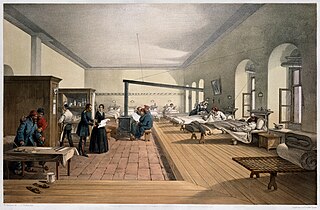Related Research Articles

The American Medical Association (AMA) is an American professional association and lobbying group of physicians and medical students. Founded in 1847, it is headquartered in Chicago, Illinois. Membership was 271,660 in 2022.
In the United States, an independent practice association (IPA) is an association of independent physicians, or other organizations that contracts with independent care delivery organizations, and provides services to managed care organizations on a negotiated per capita rate, flat retainer fee, or negotiated fee-for-service basis.
The Canadian Medical Association is a national, voluntary association of physicians and medical learners that advocates on national health matters. Its primary mandate is to drive positive change in health care by advocating on key health issues facing doctors and their patients.

The American College of Physicians (ACP) is a Philadelphia-based national organization of internal medicine physicians, who specialize in the diagnosis, treatment, and care of adults. With 161,000 members, ACP is the largest medical-specialty organization and second-largest physician group in the United States. Its flagship journal, the Annals of Internal Medicine, is among the most widely cited peer-reviewed medical journals in the world.

The American Osteopathic Association (AOA) is the representative member organization for the more than 197,000 osteopathic medical doctors (D.O.s) and osteopathic medical students in the United States. The AOA is headquartered in Chicago, Illinois, and is involved in post-graduate training for osteopathic physicians. Beginning in 2015, it began accrediting post-graduate education as a committee within the Accreditation Council for Graduate Medical Education, creating a unified accreditation system for all DOs and MDs in the United States. The organization promotes public health, encourages academic scientific research, serves as the primary certifying body for D.O.s overseeing 18 certifying boards, and is the accrediting agency for osteopathic medical schools through its Commission on Osteopathic College Accreditation. As of October 2015, the AOA no longer owns the Healthcare Facilities Accreditation Program (HFAP), which accredited hospitals and other health care facilities.
The Master of Health Administration, Master of Healthcare Administration (MHA), or Master of Health Management (MHM), is a master's-level professional degree granted to students who complete a course of study in the knowledge and competencies needed for careers in health administration, involving the management of hospitals and other health services organizations, as well as public health infrastructure and consulting. Programs can differ according to setting; although practitioner-teacher model programs are typically found in colleges of medicine, health professions, or allied health, classroom-based programs can be found in colleges of business or public health.
Health information management (HIM) is information management applied to health and health care. It is the practice of analyzing and protecting digital and traditional medical information vital to providing quality patient care. With the widespread computerization of health records, traditional (paper-based) records are being replaced with electronic health records (EHRs). The tools of health informatics and health information technology are continually improving to bring greater efficiency to information management in the health care sector.

John O. Agwunobi is a Scottish-born Nigerian-American former public health official, pediatrician, and the former chief executive officer and executive chairman of Herbalife Nutrition. He was formerly senior vice-president of Walmart and president of the retailer's health and wellness business from 2007 to 2014.

Health administration, healthcare administration, healthcare management or hospitalmanagement is the field relating to leadership, management, and administration of public health systems, health care systems, hospitals, and hospital networks in all the primary, secondary, and tertiary sectors.
Brian McDonough is an American physician with a focus on patient education. A dual citizen of the United States and Ireland, he consults and speaks on podcasts. He is a member of the Broadcast Pioneers Hall of Fame. He earned the title "Philadelphia's Family Physician" as a result of serving in his role as Medical Editor at KYW Newsradio since 1988 providing daily reports. He serves in a similar capacity at 1010WINS in New York City where he has been heard daily since 1996.

The Society of Hospital Medicine (SHM) is a membership society for hospitalists, physicians, and other caregivers who practice the specialty of hospital medicine.
Integrated care, also known as integrated health, coordinated care, comprehensive care, seamless care, interprofessional care or transmural care, is a worldwide trend in health care reforms and new organizational arrangements focusing on more coordinated and integrated forms of care provision. Integrated care may be seen as a response to the fragmented delivery of health and social services being an acknowledged problem in many health systems. This model of care is working towards moving away from a siloed and referral-based format of care to a team-based model.
Clinical peer review, also known as medical peer review is the process by which health care professionals, including those in nursing and pharmacy, evaluate each other's clinical performance. A discipline-specific process may be referenced accordingly.
David M. Eddy is an American physician, mathematician, and healthcare analyst who has done seminal work in mathematical modeling of diseases, clinical practice guidelines, and evidence-based medicine. Four highlights of his career have been summarized by the Institute of Medicine of the National Academy of Sciences: "more than 25 years ago, Eddy wrote the seminal paper on the role of guidelines in medical decision-making, the first Markov model applied to clinical problems, and the original criteria for coverage decisions; he was the first to use and publish the term 'evidence-based'."
Health care quality is a level of value provided by any health care resource, as determined by some measurement. As with quality in other fields, it is an assessment of whether something is good enough and whether it is suitable for its purpose. The goal of health care is to provide medical resources of high quality to all who need them; that is, to ensure good quality of life, cure illnesses when possible, to extend life expectancy, and so on. Researchers use a variety of quality measures to attempt to determine health care quality, including counts of a therapy's reduction or lessening of diseases identified by medical diagnosis, a decrease in the number of risk factors which people have following preventive care, or a survey of health indicators in a population who are accessing certain kinds of care.

Olivier Brandicourt is a French business executive and physician, and the former chief executive officer of Sanofi.

Ultimate Medical Academy (UMA) is a nonprofit career education school that grants associate degrees and diplomas in allied health professions.
Patricia Anne Gabow is an American academic physician, medical researcher, healthcare executive, author and lecturer. Specializing in nephrology, she joined the department of medicine, division of renal diseases, at the University of Colorado School of Medicine in 1973, advancing to a full professorship in 1987; she is presently Professor Emerita. She was the principal investigator on the National Institutes of Health Human Polycystic Kidney Disease research grant, which ran from 1985 to 1999, and defined the clinical manifestations and genetics of the disease in adults and children.

The American Medical Group Association (AMGA) is a non-profit trade association headquartered in Alexandria, Virginia. AMGA represents the interests of multi-specialty medical groups and integrated health systems in the United States.
David B. Nash is an American physician, scholar and public health expert, known to be Founding Dean Emeritus, and named chair Professor of Health Policy at the Jefferson College of Population Health. Noted for his academic work to promote public accountability for clinical research outcomes, Nash is also a known voice on population health policies. He has authored hundreds of peer-reviewed scientific articles, published many books on healthcare subjects, and acted as a chief editor in several medical journals.
References
- ↑ Leadership, American Association for Physician. "About the American Association for Physician Leadership". www.physicianleaders.org. Retrieved 2022-07-11.
- 1 2 3 Robeznieks, Andis (September 22, 2014). "ACPE changes name to reflect shifting healthcare realities". Modern Health Care.
- ↑ "Dr. Peter Angood: Empowering Physicians, Redefining Healthcare". Aspioneer. 2021-10-13. Retrieved 2022-04-12.
- ↑ "Physician Leadership Journal". American Association for Physician Leadership. Retrieved 6 August 2024.